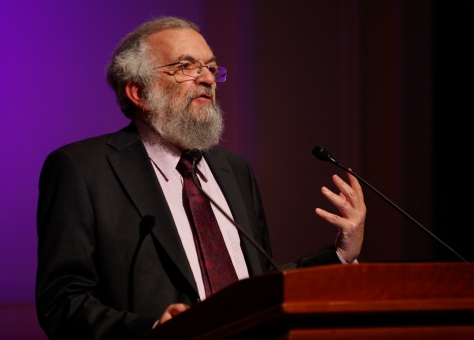Raag Yadava

In May, 2022, the world lost Professor Joseph Raz, one of the foremost jurists and politico-legal philosophers of our time. In this piece, Professor Raag Yadava looks back on Professor Raz’s towering and enduring legacy, and its continuing relevance for our times.
Professor Joseph Raz, Professor of Philosophy of Law at the University of Oxford (1985-2006) and Professor of Law at Columbia Law School (2002-22), passed away on 2 May 2022. His passing came as a particular surprise, a loss, because I was reading his Between Authority and Interpretation with my students in our Interpretation course that week. Indeed, his works have become a staple in legal philosophy, so much so that it is difficult to study the subject without acknowledging one’s debt to Professor Raz, who was aptly crowned “one of the last remaining giants of jurisprudence and philosophy”.
Professor Raz’s work has a beautiful mix of sustained, concentrated reflection in an easy conversational style. Reading him over the course of three weeks with my students, one almost got the sense that we were having a discussion with him, excavating his views and developing ours in turn. When I heard of his passing, that intellectual tutelage and friendship was broken for a moment. One makes surprisingly unexpected, if hidden, connections with an author when reading his works closely, even when separated by oceans and decades. In the spirit of that connection, this obituary is less a recounting of Professor Raz’s voluminous and celebrated scholarship, or his biography (or photography), which can be found on the Oxford Law Faculty’s website, but more a ‘remembrance by reflection’ on an idea from his thought that has influenced me: perfectionism.
In his The Morality of Freedom, a book I read and struggled with first as a graduate student, Professor Raz asks an age-old question: what is political freedom and how are we to preserve it? Before I wrapped my head around the argument of the book, two methodological points struck me as I began my study. Speaking of freedom, one is, not without reason, given to passionate, poetic bursts, lofty ideals wrapped in fire and song. But in Professor Raz, I found that passion in a different way, in the spirit of sustained, almost unforgiving use of reason with which he attacked the problem. I often mistook, as I read through the dense volume, a lofty sobriety for a pedantic tepidness, and yet I discovered the strength of his views lay not in rhetorical flourishes, but an exacting precision that compelled the reader into rational submission at the altar of his impregnable argumentative fortress. His book schooled my mind into the mode of a dispassionate reflective analysis, a microscopic decomposition of each thought into its most fundamental constituent parts, then adding each brick up to up to construct an ornate, harmonious mental cathedral. The second thing I found was how charitably, yet critically, he examined alternate views, giving to his opponents respect and refusing to caricature their views. His reason probed deep into the territory of the opponent, with a remarkable light of clarity, at once cool, calm and vigorous to extract what was true, and carefully dismantle what was not. This means that to disagree with Professor Raz’s views demands the greatest intellectual weaponry and humility one can muster. The impeccability of his method continues to inspire me and will, I hope, be a lasting legacy that we must all learn from.
Professor Raz begins his book with this invitation:
“In inviting the reader to join me on this voyage of exploration I have made it clear that our purpose is not that of those who set out to draw maps of the oceans and who have to record all their currents, islands and shores. Ours is a different mission. It is that of explorers looking for the best navigable channels to reach a destination, ours being a view of the ideal of individual freedom and its role in politics.”
In his voyage of exploration, and it really is an exploration of new ideas, rather than a philosophical tract that seems bent on proving its point, Professor Raz tackles one of the most intractable issues in liberal political theory: neutrality, or anti-perfectionism. The doctrine of neutrality wants the government to remain entirely neutral, or at least as far as possible, between valid and invalid ideas of the good life. This is an intuitively attractive idea. As Professor Raz notes:
“At the intuitive level anti-perfectionism responds to a widespread distrust of concentrated power and of bureaucracies. The best intentions and the wisest council are likely to misfire if entrusted to the care of the machinery of state action. Beyond that there is the deep-felt conviction that it is not within the rights of any person to use the machinery of state in order to force his conception of the good life on other adult persons.” (p. 111).
As any student of history can attest, this is a valid fear. Yet the route from a distrust of concentrated power to anti-perfectionism, in Professor Raz’s view, needs some uphill travelling. It seemed odd to me, on my first forays into politics, and still now, that the state, a collection of representative individuals, should not have, let alone promote, any ideals of the good. Politically and epistemically, this seemed worrisome. Is neutrality even possible, and if so, it is desirable? What kind of a state or politics does this look like, where we don’t speak about the good and the moral? Faults may come, excesses may occur, but surely neutrality as a bright line prescription was going too far. A medicine in excessive dosages can be poisonous. It may create a new problem just as it solves an old one.
Professor Raz’s reply is characteristically nuanced and illuminating: that neutrality is ‘chimerical’. (p. 121) Trying to remain neutral in a state of non-egalitarian distribution, which is how our world is, by inaction, not choosing between competing ideals of the good – what Professor Raz calls ‘comprehensive neutrality’, in Rawls, and ‘narrow neutrality’, in Nozick, his primary interlocutors in this debate – is not neutrality. He begins with two analogies: first, if I owe my client a duty, Professor Raz argues, to increase the value of his investment portfolio, and I fail to make an investment that would enhance my client’s net worth, I am positively harming my client; and second, a surgeon who fails to take action to help the recovery of a patient is harming that person. Not doing something does not mean that we are neutral. To this, it may be said that the doctor and the banker owe positive duties to help, but the state does not. Professor Raz’s careful, and far-reaching, reply is this: if the state has created conditions of equal opportunity, where all can choose any conception of the good, then neutrality is possible. He turns Nozick’s argument on its head, using his assumptions to argue against his conclusions.
But short of that, hampered in one way or another, as we are today, and in many cases, especially in India, seriously so, the narrow neutrality argument fails. Narrow neutrality wants governments to remain entirely agnostic to any conception of the good life, refusing to make it easier or more difficult for anyone to achieve their conception. But this, Professor Raz argues, is an impossible ideal because state inaction, a decision to not help – much like the doctor and banker – is the same as hindrance. Pre-existing hindrances need positive action, not neutrality. This reminds us of the Parable of the Good Samaritan, but asks more by turning uncharitable inaction into positive harm, and provides also in the process an incisive ethical insight to evaluate our own daily inaction. Professor Raz argues in exacting detail how neutrality is an impossible ideal. Choices, for him, cannot be avoided.
Nor need they be. Professor Raz goes on to probe neutrality further, to ask if its comprehensive neutrality avatar is desirable. Comprehensive neutrality wants the state to remain agnostic to any conception of the good life (so long as rights of others are preserved, and primary goods for all are secured – which itself, as Professor Raz notes, dents the neutrality claim), but create conditions to help each to realise their own conception. We don’t judge any, we support all. As Michael Walzer points out, one of the most problematic parts of liberalism, at least of the kind Rawls spoke about (though here too we must take a cue from Professor Raz to not caricature, as Rawls has been at the hands of his critics), is an alleged hollowing out of the public sphere: where there is no right or wrong, no necessary truths or values, a denial of a morally thick political sphere, all of which often equates to a rescission of tradition. Collective solidarity and the public virtues break down into self-authenticating individual bubbles, and instead, we operate on a thin, indeed as thin as possible, agreement between people, or constructivism. Does liberalism’s commitment to agent autonomy mean that we are infallible arbiters of our own lives, a slide into a worrying subjectivism, or can we preserve pre-established rights and wrongs, the moral cement of our collective lives, without affecting our commitment to liberty? Must we lose one for the other?
Professor Raz bites the bullet: liberty for him is the liberty to pursue worthwhile things, and we can, as perfectionists, validly claim that some conceptions of the good, some kinds of lives, are worthless and demeaning. We can a priori exclude some ideals as a society without affecting liberty. Not because we consider them to be so out of personal preference, but because reason shows them to be. Being ‘value-blind’, for Professor Raz, is a morally hazardous route to take, even if out of a well-intentioned fear of excessive governmental action (p. 136) Instead, we can be value-plural: the ‘live-and-let-live picture’, (p. 144) so common to popular liberal understanding, is only half the picture. We must ‘live-and-let-live-together’ in common pursuit of the good. We want the state to help us achieve our goals, and to push us to pursue good ideals instead of bad ones, for which a cultivated rational plurality, rather than blindness, is the appropriate antidote. So, for example, Professor Raz argues that “want-satisfaction qua want-satisfaction”, a common and unfortunate occurrence in consumer societies, is “not intrinsically valuable”, because our desires are best seen as “reason-dependent.” (p. 142). Fulfilling some of our desires may be clearly irrational and contrary to our reasoned-out moral good. We may, in our own assessments, think otherwise, driven by the clamorous craving of our desires. Or we may want to act selfishly in disregard of the public good.
But that kind of wrong thinking does not, as the anti-perfectionists claim, generate reasons for the state to remain indifferent to (to the extent neutrality is possible), or create conditions that promote, such behaviour, in deference to our liberty and self-chosen version of our good life (at least not for craving-satisfaction itself, unless it is backed up by some higher-order interest that can be argued out). A liberal state need not support falsehoods and bad life choices in the name of liberty (“but it’s my life and that’s how I want to live“), unless we have good reasons to say that the support fortifies valuable liberty in turn. The universalizing function of reason, so much under attack, finds one of its deepest defences in Professor Raz. Collective moral choices, for him, are valuable cultural statements that mark out, foster and support forms of the good life, not unavoidable claims we must tolerate at the hands of an untrustworthy state. For those interested in the preservation of liberty, and yet demand a public sphere, or state, that can make claims to the good, a harmonisation of the two ancient enemies, Professor Raz’s Morality of Freedom is a nuanced and forceful defence of liberal perfectionism, an important pillar of his intellectual legacy that we must discuss and debate.
Contrary to market naturalism, Professor Raz’s humanist account allows us to explore coercion as an autonomy fortifying limitation; contrary to arguments that look to autonomy as individual licence, Professor Raz’s view of the acculturation of autonomy in a perfectionist world gives us reasons to see more carefully how, not if, we should limit invaluable autonomy for our own good; and contrary to the insistent demand that state action ought to be content-independent, Professor Raz reminds us that neutrality is neither possible nor desirable. Hard choices must be made aided by the sobriety of dispassionate thinking and collective reason, within the highest traditions of our public culture. To achieve a free society, we must publicly debate and reason valuable conceptions of the good, believing in at least a serious impartiality and objectivity of reason (which demands a rigour, reflection and sincerity of which Professor Raz is an exemplar) that can carry plural conceptions of the good, but can come down against invaluable ideals. This carries risks, as Professor Raz notes, that we may end up imposing our views on others. Yet it is a journey that cannot be avoided: “the general effect of the risk of failure cannot lead to anti-perfectionism.” (p. 160).
In navigating the choppy waters between value blindness and value monism, Professor Raz’s value pluralism is, in my view, his singularly important contribution to liberal politics: accepting that there are many morally valuable forms of life that can be publicly affirmed as liberty enhancing, not denying, artefacts allow us to engage in reasoned conversation with each other, generating a public sphere that is self-consciously moral, yet plural, and liberal, yet not hollow. Liberal politics can foster valuable forms of collective life. As Professor Raz notes:
“Supporting valuable forms of life is a social rather than an individual matter…It requires a culture which recognizes it, and which supports it through the public’s attitude and through its formal institutions…Anti-perfectionism in practice would lead not merely to a political stand-off from support for valuable conceptions of the good…[i]t would undermine the chances of survival of many cherished aspects of our culture.” (p. 162).
In reminding us that a morally thick politics is a partner, not an antagonist, to our cherished freedoms, Professor Raz’s views push us to think more about what freedom means to us, not just as individuals, but as societies. This is a question of particular import in India today, where we can benefit in great measure by a close study of The Morality of Freedom. For the political explorers of the future, Professor Raz’s lasting legacy will be as a lover of freedom and a deep humanist, an intellectual giant under whose canopy we can grow into our own. If there was a rational political deism, Professor Raz would be its archangel.

Raag Yadava is an Assistant Professor of Law at the National Law School of India University (NLSIU), Bengaluru.



















